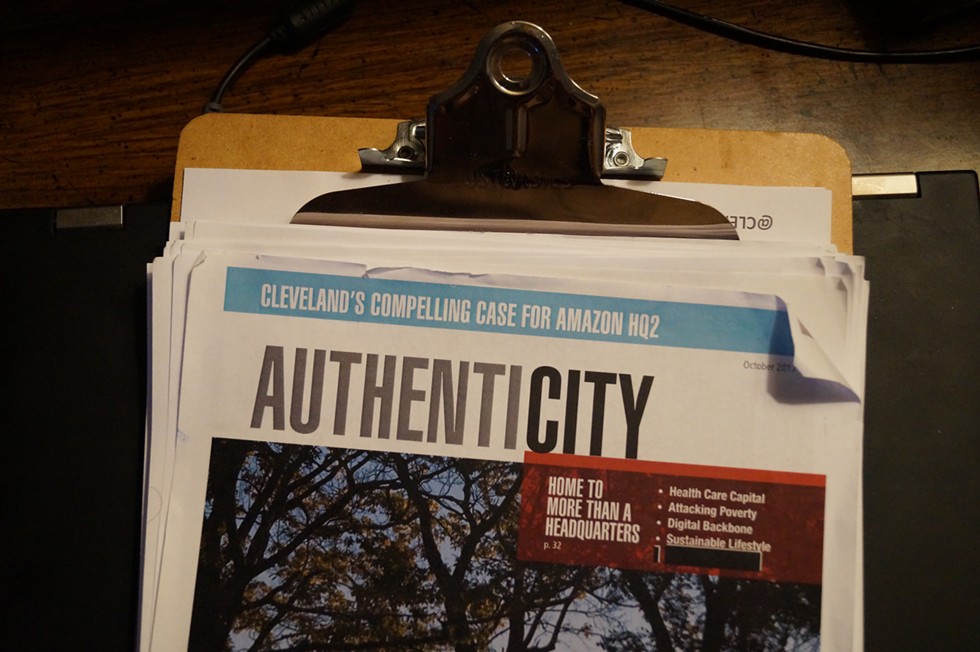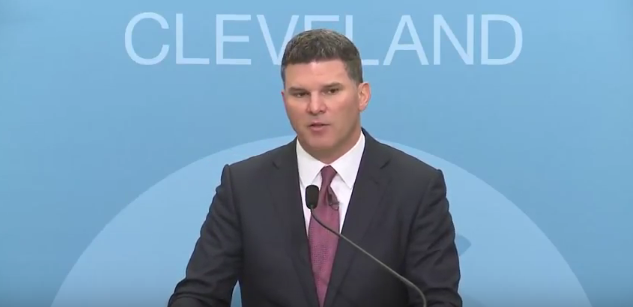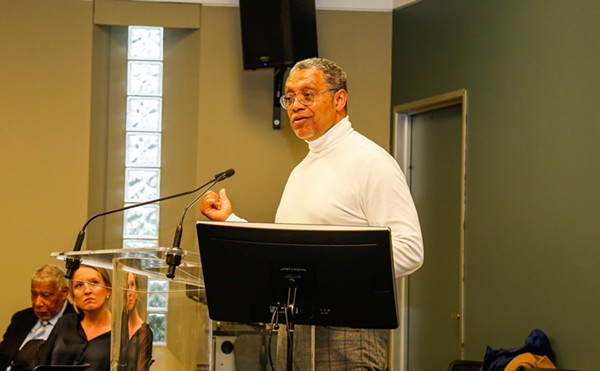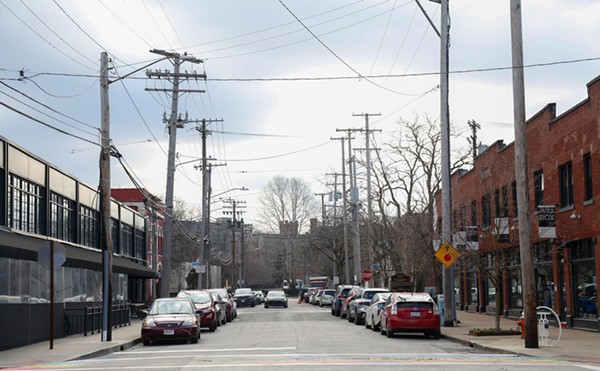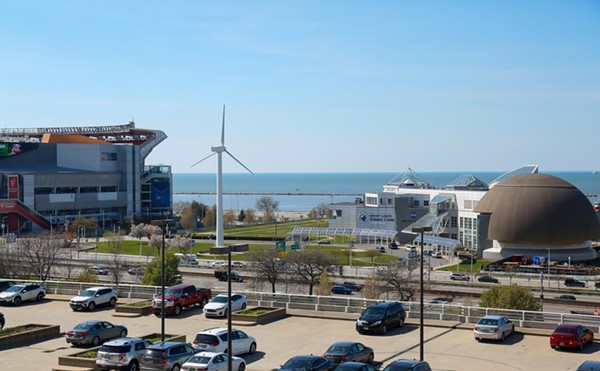Big dreams create the magic that stir men's souls to greatness.
— Bill McCartney
Here I sit, broken-hearted. Paid a dime and only farted.
— anonymous
(1)
Like others in the ramshackle local press corps, I assumed that Cleveland's heavily redacted Amazon bid, released last month after no shortage of fuss, wouldn't have much journalistic value.
I almost didn't bother reading it. On a recent episode of WCPN's Reporters' Roundtable, host Rick Jackson remarked offhandedly that there was more redacted material in the bid than there was available to the public. Cleveland.com editor Chris Quinn dismissed it as well, suggesting that the unredacted content explained nothing that we didn't already know. At the time, I nodded along. I had my own views about the city's shortcomings, but only the bid's incentive package (still under lock and key) would definitively tell the story, I thought.
Because the story, surely, was how and why Cleveland failed to make the list of 20 cities that Amazon named as finalists for its second headquarters back in January. This seemed cut and dry.
Now, I'm not so sure.
I still believe the public is owed the full unredacted bid so we can assess the offered incentives, which are no doubt grotesque. I also wholeheartedly stand with those who have criticized the comical over-redaction throughout the released version, where what appear to be innocuous paragraphs are blacked out in full.
But I decided it seemed wasteful not to bring some old-fashioned journalistic rigor to bear on the available material, which turned out to be ample: the majority of seven of the bid's eight main sections, and more than 120 pages of attachments and supporting documents — the "appendix," officially — most of which was not only bad, but bad in uniquely Cleveland ways.
While I concede that discussing many of these in depth would be overkill — the clumsy PowerPoints, the distracting and often redundant source links, the hideous and uncoordinated fonts — a few are worthy of careful consideration.
Because even with significant redactions, the bid goes a long way toward telling an important story. It's not about how Cleveland's bid failed, but how its leaders have.
(2)
Before diving in, let's return to Feb. 9, 2018.
On that date, Cuyahoga County executive Armond Budish's chief of staff, Sharon Sobol Jordan, abruptly announced that she'd be vacating her $177,000-per-year post to become the CEO and first full-time employee of something called the Unify Project.
I trust I wasn't the only one who greeted word of this hopscotch exit with skepticism — or rather, cynicism, the full-blown variety that tends to result in coffee all over your computer screen or conversation partner. Sobol Jordan had been the subject of a subpoena by the county prosecutor's office, delivered to county HQ that very day, and when I read about her new gig, I hooted: "How convenient!"
Besides, what the hell was the Unify Project?
In his story explaining Sobol Jordan's departure, Cleveland.com's Peter Krouse reported that the Unify Project was a "nonprofit-supporting organization to the county and other public and nonprofit agencies." When it launched, it would supposedly "employ massive sets of data, machine learning and blockchain technology to unify socioeconomic data at scale."
It's unclear what any of that meant. Krouse struck out when he attempted to glean additional details, in English, from one of the Unify Project's co-founders, Stephen McHale. (McHale is the big-shot angel investor and Explorys founder who, among other things, was one of the Eight White Males called upon to lead by lawyer Jon Pinney in his ballyhooed City Club speech last month).
"McHale declined to elaborate on the Unify Project's goals," Krouse reported, "or the technology that will be used to achieve them."
A county press release on Sobol Jordan's move declared that the Unify Project was set to "officially kick off" this spring.
Alas, spring has come and gone. Ass-cracks everywhere are approaching their summer swampiest, yet the Unify Project remains a mystery. My early cynicism about Sobol Jordan's sudden change of scenery seemed to be gaining merit by the hour. After solid early reports by Cleveland.com and Scene about Sobol Jordan's MBA at Ohio State, a degree pursued on county time with Armond Budish's blessing (an arrangement county prosecutors were most keen to explore), there had been no news of what she was up to in her new role.
I sought updates on the Unify Project's progress last month, sending an email to the "[email protected]" address not unlike an island castaway hurling a bottled rescue plea into the ocean. Who against hope believed in hope, etc.
So I was delighted — frankly stunned — to be contacted by co-founding director Jim Hickey a few days later. From an airplane seat, Hickey told me that the Unify Project was still in "startup mode" and likely wouldn't have any concrete information to share until late summer. Even that time frame sounded tentative over the phone.
When I asked him what the Unify Project was, exactly, and told him I was curious how it related to luxury car-dealer-cum-civic-star Bernie Moreno's quote-unquote Blockland initiative, Hickey offered to put me in touch with Charles Lougheed, another co-founder. Lougheed was serving as interim CTO, Hickey said, and could more capably explain the blockchain technology that may or may not have something to do with the Unify Project's goals.
Please do, I said.
But to be clear, the Unify Project is still in pre-launch territory. There is no information whatsoever on its website. Peter Krouse's story has been the only thing written about it in the local media. It doesn't do anything yet. It's not an insult to suggest that the project's timeline, clients and deliverables, to say nothing of its mission, are still very much subject to change.
So I was surprised — this is a rhetorical device; I was not surprised — to see the Unify Project featured so prominently in Cleveland's failed bid for Amazon's HQ2.
(3)
The Unify Project, styled throughout the bid as a single word, appeared on the package's very first page of text after the table of contents. It was extolled as one of the top five regional selling points by Cleveland mayor Frank Jackson and county executive Armond Budish.
"Only in Cleveland," they wrote, "the UnifyProject is leveraging the power of big data to create a sustainable investment system that will define health and drive solutions to poverty."
This was wild. It was second only to "health care" on the list of areas "where we authentically shine." (The bid's title, for the record, was "AUTHENTICITY," about which please don't get me started.)
Later, in the "Innovation and Entrepreneurial Spirit" section, the Unify Project was described once again as "an investment model" geared toward eradicating poverty.
"Poverty is unacceptable, unnecessary and unsustainable," the bid declaimed, a statement belied by the region's policy prerogatives of the past half-century. "The goal of the UnifyProject is to shift from a charity to an investment model and build an inclusive economy that empowers all to live in prosperity. The project focuses on using big data to drive efficiency in redefining health, optimize the use of resources and reshape the medical and health care world to invest in and ensure sustainable, scalable solutions."
Quoth the raven, "What the fuck?"
This word salad made even less sense than McHale's early quotes to Peter Krouse. It was news to me, for example, that the Unify Project had so much to do with health care. That sounded much more like Explorys, Stephen McHale's company that was sold to IBM.
And if you'll forgive the tin foil hat, it probably was Explorys, harvested from that company's product descriptions. Take the Explorys "value-based care offerings," which — this is straight from the website — "deliver innovation designed to help drive value for providers and health care organizations as they work to manage population health, deliver more efficient care, engage patients and consumers, and optimize business performance through the power of data-driven insights."
It's not cut-and-paste plagiarism, but the bid's copywriters certainly seem to have been working from the same laundry list of buzzwords: Big data! Optimization! Efficiency!
What was obvious to me, reading the bid's descriptions of the Unify Project — and I mean instantly — was that the Unify Project did not yet exist. Here was an imaginary organization cobbled together from a handful of sexy, though not necessarily compatible, themes.
Nevertheless, in the bid's final section, "Cleveland Tiebreakers," the Unify Project was hailed yet again, described in similar, but somehow even more embarrassing, terms.
"The UnifyProject is the most broad-reaching effort ever mounted to use big data, artificial intelligence and machine learning to end poverty," the bid read. "The project brings together the brightest minds in medicine, education and philanthropy. It offers a dynamic opportunity to utilize Amazon expertise, technologies and cloud capacity, and to collaborate on the world's most ambitious urban renewal effort."
There's no use unpacking all that nonsense. It's enough to recall that the Unify Project does not yet formally exist. It cannot be the most broad-reaching effort ever mounted to do anything, because it has not yet been mounted. According to its founding director not two weeks ago, it's still in "startup mode" and won't be able to provide information of any kind for at least a few months. That would be bonkers enough on its own. But recall that Cleveland's Amazon bid was completed in October 2017, a full five months before the Unify Project hired its first full-time employee.
This is not to disparage the Unify Project. For all I know, it really might become a legitimate effort to reshape the medical world. Alternately, it might become the most broad-reaching effort ever mounted to end poverty. It might have something to do with blockchain technology. It even might be the world's most ambitious — Lord give me strength — urban renewal effort.
But right now it's just an idea, or perhaps a batch of ideas, that may or may not ever cohere. I, for one, have yet to be convinced that it's anything more than a pipe dream whose publicity was accelerated to provide a soft landing for a political ally in hot water. Hickey told me that he and the other cofounders were working part time from a base of operations on the old Hornblowers barge, home of Hickey's other company, Arras Keathley communications. And it sure didn't sound like a launch was imminent.
What I'm trying to criticize is not the various potential goals of the Unify Project, rather, the absurdity of vaunting it — indeed, of including it among the region's top five selling points — before it has accomplished anything, or even figured out what it intends to do.
This is lunacy.
The level of self-delusion (or else bald deceit) involved in framing the Unify Project, an abstract set of ideas based on buzzwords, as the most broad-reaching effort ever mounted, or as the most ambitious anything, is staggering. But it provides critical insight into how Cleveland's leaders think and operate.
(For shorthand — and I know the term has baggage — I'll refer to the region's business and civic leaders, and the politicians in their pockets, as "elites.")
(4)
What local elites love more than anything is a superlative.
They want the region to be, or be home to, the biggest, the best, the most and the first ... of anything. This is why Jackson and Budish begin their description of the as-yet nonexistent Unify Project with the ejaculatory, "Only in Cleveland." This is why the bid's authors, in concert with elite preference, boldly assert that an untested project in startup mode is — note: not "will be," is — "the most broad-reaching effort ever mounted," without having any clue (or preference, I'd submit) about what the effort will be mounted to do.
End poverty? Redefine health care? Create an investment model? Unify socioeconomic data at scale? Do something related to urban renewal? Who cares! It's immaterial.
All that matters is the superlative. It's an obsession, an imperative of local elite culture. And it leads to the cringe-worthy hyperbole that's absolutely everywhere in the failing bid.
The superlative imperative lurks behind the slavering promotion of Cleveland's inclusion on national lists. "Just last week, USA Today named us one of the top romantic spring getaways!" Armond Budish rejoiced at nothing less than his State of the County address in 2015. "I don't know how they conducted that survey, but we'll take it!"
The superlative imperative not only leads to, but necessitates, irrational decision making. In the elite consciousness, being among the smallest U.S. cities with three major sports teams is so positive — we get to "punch above our weight class" — that it's worthy of crippling ongoing public subsidies to preserve.
The superlative imperative perpetuates a faulty hierarchy of priorities where trivia trump quality. Local elites can be counted upon to mention, just for one example, that Cleveland was the first city to connect its downtown to an international airport by rail. (In the Amazon bid's appendix, where the tidbit appears, "FIRST" is in all-caps.) Yet these same elites have done nothing to advocate for the ailing public transit system of which the Red Line is a vital piece.
Broadly speaking, the superlative imperative is a root cause that has led to the region's economic stagnation. It has led elites, for decades, to pursue and promote fanciful megaprojects at the expense of Cleveland's civic and financial health.
(5)
I submit as further evidence (only because it's fresh) the mobilization efforts in the wake of Jon Pinney's City Club speech last month, which he titled, presumably without irony, "Dead Last."
Clawing out of the gutter in recent economic rankings was one of Pinney's stated goals. And yet, the emergent strategies being bandied about in the relevant C-suites are not to tackle specific problems that would drastically improve the quality of life for the region's poor — e.g. lobbying for public transit funding or the repeal of preemptive legislation that prohibits local funding mechanisms; privately funding a citywide lead-remediation initiative; creating or supporting more and better employment programs that provide paid on-the-job training and pathways for advancement; supporting legislation to increase the minimum wage — but to conjure up anything at all to be the best at or have the biggest of.
This is the superlative imperative at work. In the elite psyche, it's pathological, which means examples are not at all hard to find. You can and should — for sport, if not for corroboration — scan virtually any op-ed by a civic leader from the past 40 years to see what I'm talking about. Take Pinney's most recent piece in Crain's. In it, he said that he and his Leadership Cleveland cohort had developed a plan to help get Cleveland off those damnable lists.
"A group of business and civic leaders, including myself, have formed a planning team to build the nation's largest and most advanced technology and entrepreneurial ecosystem hub," he wrote (italics added). "We picked an ideal site, met with the property owner who sees the vision and are working on a model. Anyone who wants to help is welcome to join us. This will require unprecedented collaboration."
Not for nothing, but Pinney's whole speech had been about how much Cleveland's economic development system sucks. Why would he take a moonshoot, in the elite patois, which will require "unprecedented" collaboration from a leadership sector he just publicly reamed for its unwillingness to collaborate?
This is the superlative imperative. Largest! Most Advanced! Unprecedented!
Does this stuff make any sense to anyone else? As far as I can tell, it's just supposed to sound impressive. What is a "technology and entrepreneurial ecosystem hub," for example? And why would a hub, which to me just connotes a concentration of companies, itself need to be advanced?
Pinney's an easy target because he's put himself out there recently, but rest assured that the superlative imperative is deeply ingrained among elites. By now, I honestly think it's kind of unconscious, as I say, kind of pathological. Otherwise, who on earth do they think they're fooling? Certainly not Amazon, who was in any case advised, on Page 6 of the bid, that they had a "rare opportunity" to join "a business community and public sector renowned for their collaboration."
I beg your pardon? Renowned by whom?
Not by Jon Pinney, who asserted, after extensive conversations with the region's executives, that "there is no buy in, and there's no real agreement on what plan is governing our economic development system. The culture is not collaborative."
Pinney must know that one does not so easily disabuse Cleveland elites of their precious, peerless collaboration. The public-private partnership is among the most sacred of elite values. (For the record, it's a value I've regarded with extreme skepticism. My assumption, borne out by my reporting, has been that public-private partnerships, locally construed, tend to be a great deal for the private partners and a rotten deal for the public ones. Who needs reporting, though, when private partners keep raving about the success of these partnerships in defiance of Cleveland's economic performance?)
Just last week, the Greater Cleveland Partnership's Deb Janik declared at a panel that "no one does public-private partnerships better" than Greater Cleveland.
"And no one ever has," she said.
No one ever has? Sheesh. Rhapsodizing about public-private partnerships is more or less GCP's posture in repose, but no one ever has? You'd be forgiven for thinking that you couldn't get any more superlative than that, but Janik promptly one-upped herself, guiding the imperative to its logical conclusion:
"Cleveland," she told the audience, "is the greatest city in the country."
(6)
It'd be easier to dismiss a lot more of this stuff as cute boosterism if the region weren't in such bad shape. That's what makes the "think audaciously" moonshot rhetoric so offensive: It's not new. The superlative imperative has been operative for decades, and the results speak for themselves: This is a region with low educational attainment, bottom-of-the-barrel employment numbers, gasp-worthy health outcomes, dramatic economic disparities and a populace so segregated it could stand in for a pre-1968 map of Cleveland. If there's one thing elites don't need, it's more audacity.
Yet audacious goal setting has been pegged as one antidote to the region's ills.
MetroHealth CEO Akram Boutros penned a guest column for Cleveland.com shortly after Pinney's speech recasting the call for alignment thus: "To thrive as a region, we must make audacious plans... We need the next generation of leaders to set these courageous goals."
From almost any other figure, that sort of language would be both terrifying and banal, given both the calamitous and predictably calamitous results of recent audacious planning.
But Boutros, since he arrived in 2013, has behaved contrary to the established style of local elites. For one thing, he had the good sense to acknowledge the "next generation of leaders," a concept which has yet to dawn on Cleveland elites from the '80s and '90s — that is to say, current elites.
In more tangible contrast to his peers, Boutros sets goals, and then takes practical steps to achieve them.
At a speech he gave to the YWCA in 2015 (anthologized later as "I'm Guilty" in A Race Anthology: Dispatches and Artifacts from a Segregated City), Boutros described how he and his leadership team made diversity in hiring a priority at MetroHealth. They took five concrete steps, he said, including hiring a manager of diversity recruitment and making job experience carry as much weight as academic attainment for applicants. This produced striking results.
"Of the leaders we hired in 2013 ... 14 percent were minorities," Boutros said. "Last year, 37 percent of them were. If you look just at vice presidents, 25 percent of them that we hired in 2013 were African-American, Asian or Latino. Last year, every single one of them — 100 percent — were."
This message might as well have been in Tagalog as far as local elites were concerned. Their standard operating procedure is to set an audacious goal; bathe in the immediate, euphoric headlines; bully or dupe the public into paying for it, or at least a study of it; and then forget about it. Indeed, one of the most harmful aspects of the superlative imperative is that superlatives are often chased and championed for their own sake. Related outcomes seldom matter.
The "Cleveland Tiebreakers" page in the Amazon bid is luridly illustrative of this dissonance, despite the fact that only three of the five items are unredacted.
One of the three I already mentioned: the alleged urban renewal startup known as the Unify Project, which appears under the header, "Attacking Poverty."
Another is "Health Care Capital." I assumed "capital" was meant in the sense of 'human capital,' until I recognized it as an echo of the Jackson/Budish opening letter, in which they dubbed Cleveland the "medical capital of the United States." (Being anything's "capital" is a variation on the superlative imperative. See, for instance, Bernie Moreno's "Blockland" initiative, in which he wants to make Northeast Ohio the "national epicenter" of "all things blockchain.")
Our health care capital includes the CWRU School of Medicine, three highly-ranked medical centers, including the Cleveland Clinic, and the "one-of-a-kind" Global Center for Health Innovation. The Global Center is touted earlier in the bid as a "gateway to host and engage the finest medical and health care institutions and companies."
This Global Center language is not a slam-dunk example of what I've identified as the superlative imperative because it's much more bold-faced lying than self-delusion. Anyone older than four knows perfectly well that the Global Center, for the majority of its life, has been an unqualified disaster. If it's been a gateway to host and engage anything, it's been to host hungry lunchtime diners at the chic (and recently expanded!) Au Bon Pain and engage them with a sandwich.
"Desperate cities do desperate things," said economist Heywood Sanders, in a recent Chicago Tribune recap of the ill-fated Global Center. "It didn't make sense then, and it doesn't seem to make sense now." The Global Center is not an asset to be celebrated; it's a humiliation to be salvaged. Yet in the Amazon bid, it's "one-of-a-kind," a "gateway to host the finest medical companies."
The Cleveland Clinic is a stronger example. It is the crown jewel of the medical capital of the United States and is annually ranked at or near the top of authoritative healthcare lists.
And yet, as Dan Diamond wrote in a deeply reported story for Politico last year, the neighborhoods surrounding the hospital are some of Cleveland's poorest and unhealthiest. The Clinic walked away with more than $2.7 billion in profits in the four years prior to Diamond's piece, yet they pay no property taxes on their buildings in Cleveland, estimated in 2013 to be worth north of $1 billion. The exemption on what should be $35 million-plus in annual taxes is predicated in part on the hospital's community outreach. The community, then, has good reason to question whether the Clinic is doing enough.
These questions and discrepancies are flagrantly apparent — some say unconscionable — to all but the most disciplined elites, who refuse to see the folly in patting themselves on the back for the success of a healthcare facility while doing little to improve, if not ignoring outright, the health of the population.
The third and final unredacted Cleveland Tiebreaker is what's called the city's "Digital Backbone." We are told, among other things, that Cleveland owns the nation's first — first! — commercially available 100-gigabit fiber network, and "is on the path to transforming into the most wired city in America."
What the bid fails to mention is that Cleveland is very early on that path indeed. Last year, DigitalC's Liz Lazar called Cleveland's digital divide both "staggering" and "scary" in an interview with Rick Jackson on WCPN. At the time, fully 50 percent of residents didn't have internet access in their homes. Cleveland trailed only Detroit and Brownsville, Texas, in that metric. Where else but Cleveland, a city in thrall of superlatives, does "third-least wired city in America" translate to "on the path to becoming the most wired city in America"?
(7)
Any mildly alert scholarship applicant can tell you that the one thing adjudicators look for in an application, above all else, is originality. And Cleveland's Amazon bid just didn't have it. The whole thing felt so impersonal.
The attached letters from local business and political leaders were shockingly bland and templatized. Many of them featured identical sentences and statistics. Only the Cleveland Foundation's Ronn Richard bothered to include his phone number and seemed vaguely interested in sharing his personal thoughts about living in Cleveland. Frank Jackson's letter, a brisk and bloodless three paragraphs, invited Jeff Bezos to get in touch, via email, with his chief of government and international affairs, Valarie McCall.
It seems clear that GCP, Team NEO and the partners who worked on the bid probably did so in full knowledge that the region didn't stand much of a chance. I've talked to a few leaders who were not involved who told me that producing the bid was likely a grim and thankless chore. And there's always a degree of exaggeration and overselling inherent in material of this sort. The way Amazon pitted cities against each other during the HQ2 sweepstakes demanded it, in fact, which we should all interpret as a dark portent.
Still, Frank Jackson and Armond Budish praised the bid — when it was still being kept a secret — as another shining example of the region's collaborative spirit. And they repeated over and over, at the behest of their private masters, that the bid's secrecy was a prerequisite for Cleveland's ultimate victory.
Suffice it to say, it was not. And the economic development community, alongside elites more generally, have worked themselves into a lather after this embarrassment. There seems to be a genuine desire to improve in areas where Cleveland has long lagged behind.
But if elites are willing to be serious about this effort, they'll have to countenance the fact that their brand of audacious planning and public-private partnerships have immiserated and disenfranchised enormous sectors of the population for decades. Their priorities have led, in no small part, to the region's current lowly status. A truly courageous leader will tell her peers that that — their very way of thinking — is what needs to change.
I'm as stunned as anyone that the incipient Unify Project might hold a possible solution. The goal of the project, as described at one point in the bid, is to "shift from a charity to an investment model." (A model, I presume, for ending poverty.)
This struck me as accidentally accurate. Because in the current model, elites tend to view the work of improving the city through the lens of do-gooderism. Corporate citizenship, or just plain old citizenship, has been consigned to volunteers and activists and philanthropic organizations.
Equity? Integration? Literacy? Lead? In the elite consciousness, that's for the United Way to handle. That's for the Cleveland Foundation. (And fear not: The philanthropic community is likewise ensnared in the clutches of superlative. The Cleveland Foundation will always be the nation's first community foundation, even though it's no longer the largest.)
But what if elites could be persuaded to understand that these sorts of initiatives and policies —improving the lives of "the least of us," in Frank Jackson's language — were actually investments?
Boutros, in that YWCA speech, said that MetroHealth's diversity initiative was ultimately good for his organization's bottom line. "It's what makes us successful," he said. "But to reach that success, we have to first admit that we are part of the problem."
Cleveland's public and private leaders need to admit the same. Then, they need to recognize that the issues residents care about and advocate for can be good for the city's bottom line too, in both the short and long terms. Once those light bulbs flash, and elites intuit that a donation for the least of us is, in another sense, an investment in all of us, they'll be well on their way to an even brighter epiphany:
The goal should be making Cleveland better, not making it the best.

